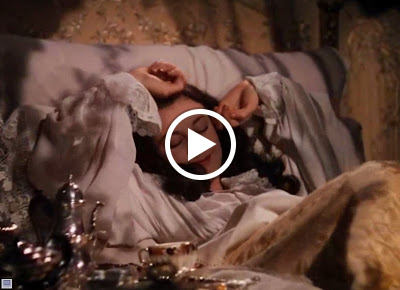One of the things I like the most about Rhett's speech is that you often find references where you wouldn't think there were any. It really speaks of Margaret Mitchell's ability to blend together various sources, both literary and historical, and relating to the specific background of her characters. Take for example this week's quote:
"'Shall we let the bugles sing truce?' he smiled down at her, a wide flashing smile that had impudence in it but no shame for his own actions or condemnation for hers. "--Gone with the Wind, Chapter XXXVI
I, for one, had always assumed this was just another case of Rhett being eloquent. But a quick googling (this time done by my co-blogger, whose eye for details would make any detective envious) revealed that the expression Rhett uses was one made fashionable by a very popular Civil War song. A song that was actually mentioned in the novel before. Here's the relevant quote:
"Nightly the dark tree-lined streets resounded with dancing feet, and from parlors tinkled pianos where soprano voices blended with those of soldier guests in the pleasing melancholy of 'The Bugles Sang Truce' and 'Your Letter Came, but Came Too Late'--plaintive ballads that brought exciting tears to soft eyes which had never known the tears of real grief."-- Gone with the Wind, Chapter VIII
"The Bugles Sang Truce" was the popular name of a song called "The Soldier's Dream," with lyrics from an early 19th century poet, Thomas Campbell. But not only that this expression seeping into everyday speech was a sign of realism on Mitchell's part, but as I read the lyrics to the song, I was struck by how closely they resemble another situation described in the book. In his letter to Melanie, Ashley Wilkes talks about the thoughts that preoccupy him at night, while his comrades are sleeping. Among those, the memory of the old times at Twelve Oaks, that he fears are gone forever:
"Instead, I see Twelve Oaks and remember how the moonlight slants across the white columns, and the unearthly way the magnolias look, opening under the moon, and how the climbing roses make the side porch shady even at the hottest noon. And I see Mother, sewing there, as she did when I was a little boy. And I hear the darkies coming home across the fields at dusk, tired and singing and ready for supper, and the sound of the windlass as the bucket goes down into the cool well. And there's the long view down the road to the river, across the cotton fields, and the mist rising from the bottom lands in the twilight. And that is why I'm here who have no love of death or misery or glory and no hatred for anyone."--Gone with the Wind, Chapter XI
Read the lyrics to The Soldier's Dream and tell us if you don't find the atmosphere similar, though Ashley's tone is more subdued:
THE SOLDIER'S DREAMOur bugles sang truce--for the night-cloud had lower'd,
And the sentinel stars set their watch in the sky;
And thousands had sunk on the ground overpower'd,
The weary to sleep, and the wounded to die.When reposing that night on my pallet of straw,
By the wolf-scaring fagot that guarded the slain,
At the dead of the night a sweet vision I saw,
And thrice ere the morning I dreamt it again.Methought from the battle-field's dreadful array,
Far, far, I had roam'd on a desolate track;
'Twas autumn,--and sunshine arose on the way
To the home of my fathers, that welcomed me back.I flew to the pleasant fields traversed so oft
In life's morning march, when my bosom was young,
I heard my own mountain-goats bleating aloft,
And knew the sweet strain that the corn-reapers sung.Then pledged we the wine-cup, and fondly I swore
From my home and my weeping friends never to part;
My little one kiss'd me a thousand times o'er.
And my wife sobb'd aloud in her fullness of heart.Stay. stay with us,--rest, thou art weary and worn;
And fain was their war-broken soldier to stay;
But sorrow return'd with the dawning of morn,
And the voice in my dreaming ear melted away.



